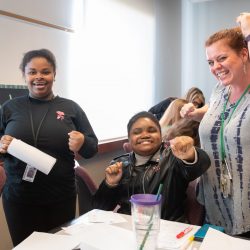Able SC Statement On Reopening Schools
As an organization led by people with disabilities, we are deeply concerned about the governor’s recommendation to reopen all South Carolina’s public schools in the fall. While the governor does suggest that students and families have the option to choose between virtual or in-person schooling, there are many flaws in this vague directive that puts the lives of people with disabilities—including disabled parents, students, and teachers—at risk.

According to recent survey results released by SC for Ed, two in five South Carolina school staff members said they have an underlying disability or health condition that puts them at an increased risk of severe illness from COVID. When you look at South Carolina nearly one million people have a disability. That includes many students, parents, and caregivers who may be at an increased risk of being infected with COVID-19.
Teachers and school personnel who have a disability (including underlying health conditions) need to be protected, but seem to be given no choice in the matter. Under the governor’s recommendation, they would have to attend school five days a week. Not only is this dangerous to the teachers themselves, but it is also putting hundreds of students and the students’ families in danger. We cannot protect students in our schools if we are not protecting teachers and school personnel.
Additionally, there is a growing shortage of qualified special education teachers and specialized instructional support personnel (such as speech language pathologists, counselors, and occupational and physical therapists) within districts. In addition to having a shortage of teachers, vacant special education positions are not being filled. Approximately 20% of all vacant teacher positions reported at the beginning of last school year were in special education. Therefore, with the shortage and unfilled positions, it is unrealistic for special education teachers and specialists to provide services both virtually and in-person 5 days a week.
All students with disabilities are entitled to a free and appropriate education (FAPE) in accordance with their individualized education program (IEP), regardless of how the education is provided. Therefore, during this pandemic, schools are responsible for providing accessible learning options, which means robust virtual schooling equal in quality to in-school education. Requiring teachers to teach full school weeks in-person means the quality of virtual schooling will suffer, and most likely impact students who are unable to return to school due to their disability or healthcare condition. Instead of reopening schools during an influx of COVID-19 cases and putting lives in danger, we should be investing in accessible and equitable virtual education and services during this time.
What we wish to see is a plan that considers the input of people with disabilities, parents, students, educators, and health professionals—all who have expertise on the subject matter. What we see currently is a lack of consideration of these perspectives, which is putting all South Carolinians at risk.
We commend the SC Department of Education and the Office of Special Education Services, which have fully incorporated the protections of all people with disabilities in their efforts. When schools closed in March, they adapted and worked with us to try to provide students with disabilities with an equitable and valuable learning experience while school was online. They are working to completely revise the system of how education is being provided while also ensuring that the health and safety of students and staff are at the forefront.
South Carolina has an opportunity here to lead innovation of quality virtual and accessible education without putting the lives of students, families, and school personnel in danger. We were encouraged by the leadership within the SC Department of Education and districts, and we know quality, accessible virtual education is possible until schools are safe to reopen. Able SC is committed to providing any assistance possible to ensure the lives of all South Carolinians with disabilities are being considered and valued in all plans.


